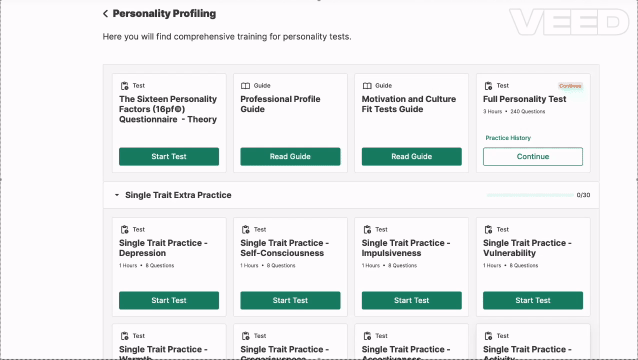Master the 16PF Personality Assessment with Confidence
Prepare comprehensively for the 16 Personality Factor (16PF) questionnaire—understand the 16 core traits, practice realistic simulations, and learn how to present your behavioral profile effectively.
The 16PF PrepPack includes:
-
Full-length practice tests and simulations covering all 16 personality scales.
-
Structured step-by-step learning program to guide you through trait theory, question interpretation, and response consistency.
-
Video-driven course with tutorials and written explanations for each trait and scale.
-
Targeted practice exercises focused on individual trait scales, response alignment, and consistency across items.
-
Realistic test interface and trait-level complexity that mirrors the actual 16PF assessment.
-
Unlimited retakes during your subscription to help you refine your responses and confidence.

- Full 16PF Practice Test
- Personalized feedback report
- Single Trait Practice Tests
- Accurate Study and Theory Guides
- Bonus: Motivation and Culture Fit Tests Guide
Course Content Breakdown
Who Are We?
At JobTestPrep, we’ve helped thousands of candidates pass competitive hiring assessments, including those at McKinsey and other top consulting firms. Our materials are designed by psychometric experts and updated based on real candidate feedback to reflect the latest game formats.
Founded in 1992 by David Meshulam, JobTestPrep has become a trusted leader in online test preparation. With 30+ years of experience, 220+ courses, and over a million success stories, we combine expert-crafted PrepPacks with AI tools like our CV Analyzer and Interview Prep platform to help candidates worldwide prepare with confidence.
FAQs
You will have instant access to your PrepPack, which includes all your practice tests. You can start practicing immediately, learning from detailed explanations and guides, while tracking your performance with accurate, tailored questions to help you understand the correct approach to solving your assessment.
After your purchase, you will receive two emails. The first will contain your payment receipt, and the second will include a login link along with information about our general terms, conditions, and refund policy. To access your PrepPack, simply log in and reset your password.
No, there is no limit. Your progress is saved in your account, allowing you to revisit previous attempts. Our performance tracker helps you focus on the test sections that require more attention.
Yes, you can extend your practice period. Simply contact our customer success team via c.serv@jobtestprep.com.




